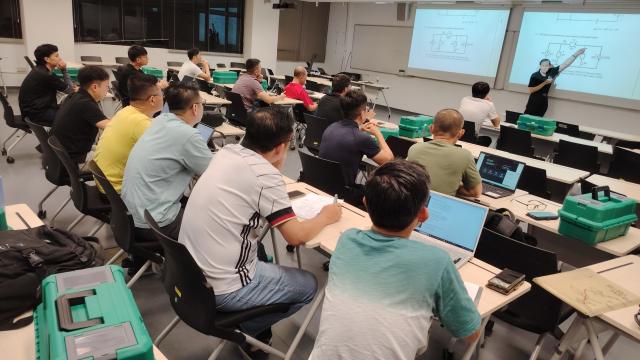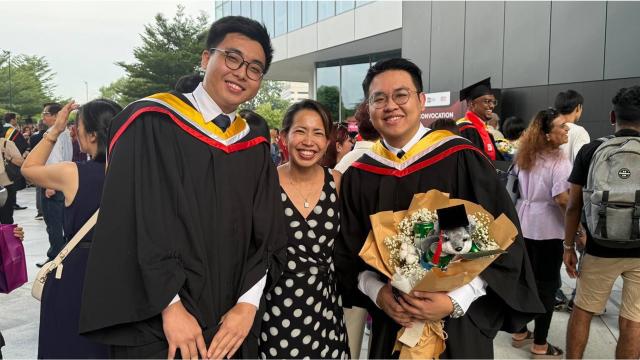When he was a teenager, SIT Engineering alumnus ME4 R R Poovindran Pillai had been misjudged as a rebellious kid who didn’t like to study. But he has come a long way since then.
Earlier this year, ME4 R R Poovindran Pillai graduated from 22nd Military Domain Experts Course offered by the Singapore Armed Forces (SAF). The 27-year-old military expert shares about discovering his passion for mechanical engineering, his university life, and why he enjoys his work at the SAF.

ME4 R R Poovindran Pillai at the 22nd Senior Military Expert Appointment Ceremony held in January 2022. (Photo: Ng Eng Hen)
Could you describe your educational journey from the Institute of Technical Education (ITE) to Singapore Polytechnic (SP) to SIT?
I faced some struggles in my academic performance during my secondary school days and was misjudged for being a rebellious kid. However, it did not stop me from wanting to improve. With some guidance from my father, I selected a course that I had the most interest in – Higher Nitec in Mechanical Engineering offered by ITE.
Eventually, I was able to excel in the field of mechanical engineering and managed to attain a Mechanical Engineering Diploma from Singapore Polytechnic in two years instead of the usual three years. With this newfound passion, I decided to pursue the Bachelor of Mechanical Design and Manufacturing Engineering degree, jointly offered by SIT and Newcastle University.
What was most memorable about student life at SIT?
The most memorable moments were the times I spent learning from my lecturers. I also treasure the times I spent with my friends and classmates who motivated me, and endured with me throughout my studies at SIT.
Where did you complete your integrated Work Study Programme (IWSP) and how did it prepare you for the working world?
I completed my IWSP with Heineken Asia Pacific. I was part of the global team and was given the opportunity to devise a ‘planned maintenance’ plan for the entire brewing assembly line throughout our global operations. It enabled me to understand how to maximise equipment performance by keeping equipment running efficiently for as long as possible. Also, I was able to translate these skill sets to my job as an army engineer, for life cycle management.
What was your proudest accomplishment at SIT?
My proudest accomplishment at SIT was completing my degree programme and being able to put a smile on my parents’ faces on my graduation day.

ME4 R R Poovindran Pillai with his parents on his graduation day at SIT. (Photo: R R Poovindran Pillai)
What advice would you give to a younger version of yourself?
If I had a chance, I would tell the younger me to always think carefully before making any decision, whether it is big or small. Every action you take will path your journey to who you will be in the future. I would also tell my younger self that grit and perseverance is important in overcoming obstacles. Do not give up, continue to fight and improve, the future you will thank you for it!

(Photo: R R Poovindran Pillai)
Who has played a significant role in motivating and developing you professionally?
I am grateful to have many supportive superiors and leaders throughout my military career. They all have different leadership qualities and styles, allowing me to draw rich lessons from them. I believe that this has and continues to make me a more flexible, pragmatic, and people-oriented commander.
What is the most common misconception people have about your specialisation?
There are many misconceptions! For example, people think that army engineers do not have social or communication skills, that we are not creative, and that our jobs are boring!
What do you like about your job as an army engineer?
My job at the SAF allows me to pursue my passion for the engineering field and a technology-related career. It also fulfils my desire to serve as a soldier and defend our nation. In these respects, the Maintenance Engineering Support (MES) Formation is the right fit for me.
MES’s vision of being a world class organisation with deep domain experts in Army’s equipment resonates strongly with me. I am also attracted to the working environment because of the tight integration and partnership between army engineers and combatants.

Poovindran Pillai getting ready for the 22nd Senior Military Expert Appointment Ceremony. (Photo: R R Poovindran Pillai)
What skill sets have you learnt in your job?
My vocation as an army engineer has equipped me with comprehensive skill sets and knowledge in system management, defence capability, management of operability and supportability of Our Army’s systems, and life cycle management (from procurement to retirement). This allows me to function effectively in supporting our combatants and enhancing their operational readiness and safety. By optimising our systems and platforms, I have also learnt how to stretch our defence dollar.
Our Army trains and operates in a very dynamic environment and we face evolving external situations and threats constantly. Therefore, I must stay well-informed of our geopolitical environment to understand and appreciate the challenges the SAF faces.
At the same time, I must continue to develop my professional engineering skills to provide effective and efficient support to the units. As I work with finite resources, I must think critically and learn to innovate, so I can do more with less. All these push me to my limits but being able to overcome them is very satisfying.


![[FA] SIT One SITizen Alumni Initiative_Web banner_1244px x 688px.jpg](/sites/default/files/2024-12/%5BFA%5D%20%20SIT%20One%20SITizen%20Alumni%20Initiative_Web%20banner_1244px%20x%20688px.jpg)


